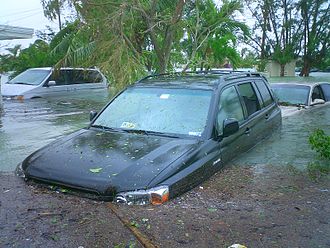Region: International
Fukushima + 3
Three years after the meltdowns, the cleanup is still underway and the safety of the nuclear fleet is still unclear.
It’s been a little more than three years since the Fukushima accident began. Where do things stand? At Fukushima itself, the reactor owner is still struggling to get conditions under control. For instance, Asahi Shimbun reported last month, Treatment of radioactive water at the Fukushima No. 1 nuclear plant has been suspended indefinitely after a …
Continue reading “Fukushima + 3”
CONTINUE READINGIn Harm’s Way
Millions of people are in the path of rising seas. The time for action is now.
The NY Times has run a series of articles in the past few days dealing with disaster issues. Taken together, they highlight the urgency of government action to protect populations in harm’s way. One article dealt generally with the threat posed by sea level rise. Miami is something of a poster-child for these problems, given its …
Continue reading “In Harm’s Way”
CONTINUE READINGBiofuels and Food Prices
A recent economics paper suggests strongly that biofuels have raised food prices for the world’s poor.
Berkeley economist Brian Wright has a disquieting article in the Winter 2014 issues of the Journal of Economic Perspectives, which just crossed my desk. JEP is published by the American Economic Association and is a great resource for those of us who are interested in economics but aren’t professional economists. This article is a case in …
Continue reading “Biofuels and Food Prices”
CONTINUE READINGThe Perils of Rail Transit and Democracy
How Decentralized Decision-Making Can Screw Up Rail Planning and Implementation
Americans seem to love democracy but hate many of the results. We want governmental power to be decentralized, whether it’s across three federal branches or with local control over sometimes regionally oriented land use decisions. But when the inevitable compromise that is required to get majority approval means a less-than-perfect result, from Obamacare to budget …
Continue reading “The Perils of Rail Transit and Democracy”
CONTINUE READINGTwo good recent articles on environmental law
Regulating diffuse harms is a key future challenge for environmental law
JOTWELL is a blog dedicated to highlighting some of the best, recent legal scholarship. I recently posted a review there of two excellent recent articles in environmental law — I think they’re both terrific because they both highlight what I think will be an increasingly important issue in the future of environmental law: How we …
Continue reading “Two good recent articles on environmental law”
CONTINUE READINGIn Memoriam: Joseph L. Sax, Gentleman, Scholar, Giant of Environmental Law
Visionary environmental advocate will be sorely missed, long remembered.
[Posted on behalf of all Legal Planet authors at Berkeley Law.] It is with great sadness that we share the news of the passing of Joseph L. Sax, James H. House and Hiram H. Hurd Professor of Environmental Regulation (Emeritus) at Berkeley Law. Joe was our hero, our teacher, our mentor, our colleague, our friend. …
Continue reading “In Memoriam: Joseph L. Sax, Gentleman, Scholar, Giant of Environmental Law”
CONTINUE READINGProtecting Marine “Wilderness”
A new study shows how to strengthen marine preserves.
The Bush Administration is not remembered fondly by environmentalists, but one important exception came at the beginning of 2009. That’s when President Bush created an additional 195,000 square miles of marine reserves, on top of the 140,000 miles he had created previously. Such marine reserves are not unique to the United States, of course. Yet, …
Continue reading “Protecting Marine “Wilderness””
CONTINUE READINGClimate Impacts: The Economist’s View
Climate change may damage economies more than previously thought.
The Economist has an important story about climate change impacts. There are two big takeaways, one about growth in developing countries and one about economic repercussions in developed countries like the U.S. It has long been known that climate change will impose costs on developing countries. But there is increasing reason to think that it …
Continue reading “Climate Impacts: The Economist’s View”
CONTINUE READINGNewsflash: Not All Climate Stories are Dismal, Scientists Actually Try to Discover the Truth
Methane Leaks Not Caused by Human-induced Climate Change,
NPR aired a story this week about what scientists thought, in 2008, were ominous signs of a warming ocean. Churning bubbles of methane — a very potent greenhouse gas — were pouring out of the ocean floor in Arctic Norway. Scientists theorized that as the globe and the oceans warmed, the methane trapped in the …
CONTINUE READINGWhen Cooking Can Kill
Cookstoves are a major threat to health in developing countries, while also wreaking environmental damage.
Cooking dinner, as it turns out, is one of the most serious public health and environmental problems in the world. There’s a common misperception that environmental concerns are just a First World luxury. But the cookstove example shows that the global poor, too, are in need of better, more efficient, less polluting energy sources. Here …
Continue reading “When Cooking Can Kill”
CONTINUE READING











